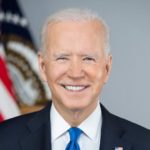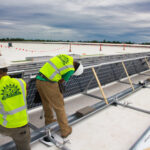Trump plans to increase tariff on imported solar panels and revoke bifacial’s exemption
The tariff on imported solar cells and panels will increase next year and bifacial solar panels will officially lose their exemption status, this according to a proclamation released over the weekend by President Trump.
The solar industry was the first market to feel the hit of tariffs brought on by Trump in 2018. Beginning in February 2018, imported crystalline silicon cells, modules and AC/integrated modules were tariffed 30% as part of a four-year outline. Imports received a 25% tariff in 2019, a 20% tariff in 2020 and were scheduled for a 15% tariff in 2021.
Various exemptions to the tariffs were allowed, mainly small-wattage off-grid panels, but bifacial modules were granted a full exemption in June 2019. Bifacial modules have been growing in popularity in the utility-scale solar market, and with no domestic manufacturers able to meet the demand, the tariff exemption was seen as a break to the price-conscious utility market.
After reviewing International Trade Commission reports and receiving a petition from “a majority of the representatives of the domestic industry,” President Trump this weekend proclaimed that domestic PV panel manufacturing is increasing. He also officially determined that the bifacial exemption was undermining the objectives of the original safeguard messages (which was to prop up U.S. solar manufacturing), so bifacial modules are back to being taxed. Within 15 days of the proclamation, bifacial imports will be taxed the full tariff amount.
And since bifacial imports were not tariffed for over a year, Trump will adjust the fourth-year rate of the overall tariff from 15% to 18%. The higher tariff rate will go into effect in February 2021.
The following is a statement on the proclamation by Abigail Ross Hopper, president and CEO of the Solar Energy Industries Association:
“The Trump administration decision this weekend to expand solar tariffs and evaluate an extension of those tariffs counters critical needs of our country right now, jeopardizing jobs, economic recovery in the face of a pandemic and a clean environment. Aspects of this policy may also run counter to law.
“Since the administration imposed solar tariffs, we have fought to delay the termination of the bifacial solar panel exemption. And we have suggested many, more constructive, ways to expand American manufacturing, including targeted tax policy and suggestions for growing the whole solar supply chain in a way that would meaningfully create jobs and fuel the economy. In addition, we published a white paper with ideas for boosting the U.S. solar manufacturing economy. It should not be lost on policy makers that last year the solar industry had 35,000 manufacturing jobs as part of nearly 250,000 total jobs. These jobs are being jeopardized by COVID-19 and tariffs across the supply chain.
“We are going to consider every option to reverse this harmful approach. We also will be talking with leaders in the next administration, regardless of who is president, about the harm of solar tariffs in the context of the COVID pandemic, a threatened economy and a critical need to address climate change.”
<!–
–>
Original Source: https://www.solarpowerworldonline.com/2020/10/trump-plans-to-increase-tariff-on-imported-solar-panels-and-revoke-bifacials-exemption/












